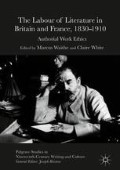Abstract
This chapter draws on correspondence, interart analogies, literary fiction, and art criticism and autobiography studies in order to probe Zola’s complex, often contradictory experience of work and his textual negotiations of that everyday experience of exasperation and, occasionally, exhilaration. Situating Zola’s physical and psychic struggle for his craft in a frame that originates with the classical artist Apelles and expands to include contemporary interlocutors of Zola such as Manet, Cézanne, Mallarmé, and Flaubert, this chapter explores the multiple intersecting worlds of work in Zola’s texts (both narrative and epistolary) and probes how words themselves work to articulate the modern writer’s equivocal engagement with work and time.
Access this chapter
Tax calculation will be finalised at checkout
Purchases are for personal use only
Notes
- 1.
Sennett’s The Craftsman travels across history and continents in its exploration of the values of craft, revealing the concept of work (through hand, through mind) as an active articulation of collaborative and creative citizenship.
- 2.
Half a century before Sennett’s sociological appraisal of craft and its implications for how people have connected with their materials and through their skills, the French Annales School of cultural history (Michel de Certeau) and structuralism (Barthes’s Mythologies, 1957) illuminated the culture of the everyday across the later twentieth century, and joined in this reflection on what it is to be human. Often the exploration of the everyday has focused on the spaces wrested from work: leisure, consumerism (food, fashion, film stars), the culture of neighbourhoods and personal space; forms of freedom and self-expression.
- 3.
The story of Apelles concerns a reputed artist who ‘collaborated’ with Protogenes by adding in colour a line to Protogenes’ initial line of drawing. Protogenes added his second line over Apelles’ first line, and then Apelles drew the final line, in what produced an abstract line drawing made possible by the artists’ collaboration (or rivalry). The story of their drawing of lines is retold by the old woman at Protogenes’ workshop at Rhodes.
- 4.
The Latin may be translated: ‘the drop of water shapes the rock not by force but by falling often: a paean to regularity and constancy of effort, to balance in things, and a further analogy of writer and ordinary worker.’
- 5.
This reference in Hardy is discussed by Chris Freeman and Francisco Louçã (2001, 171–2).
- 6.
Originally published in 1845, the work was based on Engels’ study of Manchester in 1844–45.
- 7.
A short letter to Léon Hennique on 1 September 1878 (1978–95, 3: 214–15) and the editors’ note captures the importance to Zola of hunting and the readiness of a literary associate (Hennique) to act as humble game carrier to the literary ‘big shot’.
- 8.
Elizabeth Emery’s Photojournalism and the Origins of the French Writer Home Museum (2012) is a landmark study of the development of the cultural significance and representation in text and image of the domestic habitats of literary authors.
Works Cited
Alexis, Paul. (1882) Émile Zola: notes d’un ami. Paris: G. Charpentier.
Barthes, Roland. (1973) ‘Un rapport presque maniaque avec les instruments graphiques’. Interview in Le Monde, 27 September.
Emery, Elizabeth. (2012) Photojournalism and the Origins of the French Writer Home Museum: Privacy, Publicity and Personality. Farnham: Ashgate.
Engels, Friedrich. (2009) The Condition of the Working Class in England. New York: Cosimo Inc.
Freeman, Chris and Francisco Louçã. (2001) As Time Goes By: From the Industrial Revolutions to the Information Revolution. Oxford: Oxford University Press.
Hardy, Thomas (2003). Tess of the d’Urbervilles. London: Penguin Classics.
Mitterand, Henri. (1987) Carnets d’enquêtes: Une ethnographie inédite de la France. Paris: Plon, coll. ‘Terre humaine’.
Mumford, Lewis. (1934) Technics and Civilization. San Diego, CA: Harcourt, Brace and Co.
Pliny the Elder. (1952) Natural History, vol. IX, trans. H. Rackham. Loeb Classical Library. Cambridge, MA: Harvard University Press.
Sennett, Richard. (2008) The Craftsman. New Haven, CT: Yale University Press.
Trollope, Anthony. (2008) An Autobiography. London: CSP Classic Texts.
Vizetelly, Alfred. (2008) With Zola in England. Gloucester: Dodo Press.
Zola, Émile. (1961–67) Les Rougon-Macquart: Histoire naturelle et sociale d’une famille sous le Second Empire, ed. Armand Lanoux and Henri Mitterand, 5 vols. Paris: Gallimard.
——— (1978–95) Correspondance d’Émile Zola, ed. Bard H. Bakker, 10 vols. Montreal: Presses de l’Université de Montréal/CNRS.
——— (1997) Lettres d’un enthousiaste: Lettres d’Émile Zola à son ami Antony Valabrègue, ed. Olympia Alberti. Aigues-Vives: HB Éditions.
Author information
Authors and Affiliations
Editor information
Editors and Affiliations
Copyright information
© 2018 The Author(s)
About this chapter
Cite this chapter
Harrow, S. (2018). Worlds of Work and the Work of Words: Zola. In: Waithe, M., White, C. (eds) The Labour of Literature in Britain and France, 1830-1910. Palgrave Studies in Nineteenth-Century Writing and Culture. Palgrave Macmillan, London. https://doi.org/10.1057/978-1-137-55253-2_12
Download citation
DOI: https://doi.org/10.1057/978-1-137-55253-2_12
Published:
Publisher Name: Palgrave Macmillan, London
Print ISBN: 978-1-137-55252-5
Online ISBN: 978-1-137-55253-2
eBook Packages: Literature, Cultural and Media StudiesLiterature, Cultural and Media Studies (R0)

